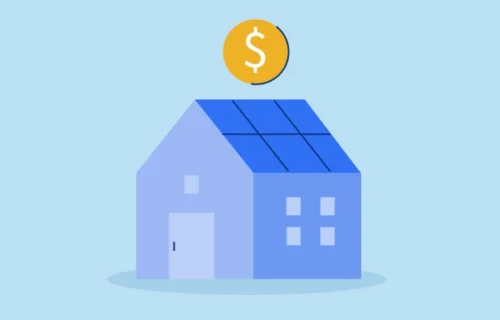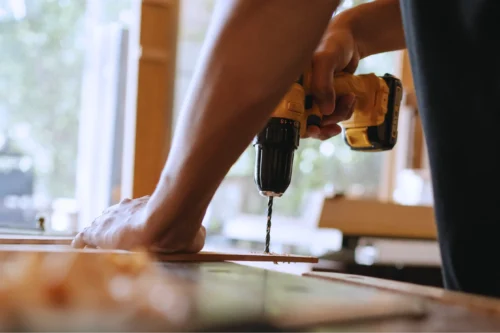
Connect with a Lima One expert today!
If you’d like to know more about this topic or see how it applies to your project, let’s talk.
The (Exaggerated) Battle Between Investors & Homeowners
Dalton
Welcome to The Real Estate of things podcast. I'm your host, Dalton Eliot. I'm joined today by Gary Beasley the CEO of Roofstock. Gary, thank you so much for joining.
Gary
Great to be here. Dalton, how are you?
Dalton
I am well, thank you. I think you and I connected at IMN East, kind of big SFR conference in the space, was it a month or two ago at this point?
Gary
Time is ephemeral these days. I think it was about six weeks maybe ago. Yeah.
Dalton
That sounds about right. Yeah, it is. What is time, but a social construct these days? So, you and I were able to catch up a little bit last week. Really enjoyed our chat. And we have a packed agenda today. First, I want to learn a little more about you and Roofstock. Roofstock is a behemoth in this space. And I was kind of impressed - would be the best word to attach to it – that Roofstock was founded in 2015? Is that right?
Gary
2015? That's right.
Dalton
Yeah. Crazy meteoric rise. So you're gonna have to give us the secret sauce there. And then we'll dive into everything from investor habits, retail investors, and homeowners vs. institutions. Other topics like affordable housing and the flood of capital from coastal markets. We have a jam-packed agenda. But like I said, first, tell me a little bit about yourself and about Roofstock.
Gary
Yeah, well, I’ll start with myself, I guess, because it gives you a little bit of an idea of my background and it's informed the way that I've sort of thought about building Roofstock. So I actually grew up in a real estate family. My dad had his owns very small, commercial brokerage firm in a small town in Indiana, Northwest Indiana, and went to college at Northwestern, which was only an hour and a half away from where I lived, but it was a world away.
I would say, my eyes sort of got opened at Northwestern to lots of things, and then I went to business school at Stanford. That was like my full awakening of entrepreneurship and all the, you know, the art of the possible. I've always had a sort of a love for real estate but a passion for innovation and looking for better ways to do things. Real estate has historically been one of those industries where residential real estate is arguably the biggest asset class in the country, when you look at the $25 trillion of assets that sit in houses, but just real estate in general, massive asset class has historically been slow to innovate.
And so I've spent much of my career at this kind of intersection of real estate and technology and looking for ways to improve things, looking to try to kind of skate where the puck is going, and take advantage of having that with the wind at your back a little bit on some of these macro trends. I spent some of my time in my earlier days in the resort business kind of after the RTC crisis, which was a while back, but that was a historic time to be able to acquire assets and redevelop them and restore them and spend some time in the early days. Roofstock is actually my third real estate startup. My first one was ZipRealty, which was one of the first online residential brokerages. It’s very similar to Redfin today. It predates Redfin a little bit. We took that company public in 2004, and I was the CFO of that business.
The next real estate startup was Waypoint Homes. We were one of the early kind of pioneers in single-family rentals. My partners, Doug Brian and Collin Wheel, from there were actually the founders of Waypoint. I joined them soon after the founding. But we built that together, really starting in about 2011, and attracted some of the first institutional capital in this space and built up quite a large portfolio of rental homes. Figured out how to build a scalable model, built some tech around it, and of taking that public as a REIT. And so I took that public as the CO-CEO along with Doug in 2014, as a as a REIT.
And so that kind of leads me up to Roofstock. April Fool's Day of 2015 was when I left Starwood Waypoint, and a lot of people thought I was kidding, because you know, the CEO sends out this note, “I'm leaving,” actually, because it was April Fool's Day. I did say I was leaving to start garynation.com, true story, to bring back the name of Gary and his story to its luster. And so that part was not true. But the part about my leaving that day was true, and so left then to start Roofstock with my co-founder Gregor Watson and Rich Ford. And within about six weeks, we had raised our series A, we raised a $6.25 million series A in late May. We're off to the races, hired a team and then got going.
It's been six years, but it's gone incredibly fast. And the market has evolved so quickly. But I mean, we knew when we were starting Roofstock, maybe I'll explain what Roofstock is, for those who don't know. We're a marketplace for single-family rental homes. So imagine, you could come to our site as an owner or buyer or seller of a rental home. And we've got products and services for you. So think about us kind of as the rails, if you will, for investors who want to participate in this asset class. So we have a robust marketplace where you can buy and sell individual homes that have tenants in them all ready or tenant ready. You can buy them sight unseen from anywhere in the world through our site and more of an ecommerce experience.
So we break down a lot of the barriers to real estate investing, bring a lot of the tools that we developed from our institutional days, and have figured out how to sort of productize it for the average investor. So you could be at a level playing field with a lot of the institutions out there that are looking at the same houses. Then we provide that last mile of servicing by offering property management through partners. And more recently, through our acquisition of Great Jones, now we have our own retail property management as well. So it's think about this as kind of a soup to nuts. Experience fully, vertically integrated. If you want to optimize your ownership experience or buy and sell, you come to Roofstock.
So think about this as sort of a managed marketplace. And we have gotten some decent traction over the over the years. We crossed over about $3 billion of transaction volume early this year. But to give you an idea of how the industry has progressed, so now we'll probably do about $2 billion of transactions just this year. So the momentum has built such that there's so much interest in U.S. housing from investors large and small that we're the wheels are rattling, we're trying to keep up with that. But we've built the business for this opportunity to really now it's we're in the place where we're really set to scale it.
Dalton
The Roofstock flywheel is in motion. It really is a beautiful platform. It’s a huge testament to you and the crew. One thing you touched on is institutional investors. And at the conference, you and I were at six weeks ago, that was a big topic of discussion. There was almost an air of us vs. them in a lot of the panels and side conversations, right? Even if you know, I'm an investor who has hundreds of units, even sizable investors, you know, a little bit of talking murmur and potential concern about the normal retail investor and the mom-and-pop type operation vs institutional investors. You know, what's your take on? You know, is this an actual battle that set up? Are we in the middle of it? Is it something that's just kind of headlined and overblown? What's with it?
Gary
Well, it's a complex question. And as you can imagine, I think the answers got to be somewhat nuanced. There's not a right or wrong. And I will say that, then they make it even more complicated. So you've got the small investor against the large investor. And then you've got all investors against homeowners competing for the same houses. And that's a whole ‘nother conversation. You know, are investors in general are crowding out homeowners? So we could address that too.
But, you know, I would say a David and Goliath story is always interesting. It's always kind of fun for the press to sort of dig into those topics. I actually think that individual investors oftentimes have an advantage over institutional investors because they do have that local knowledge. And the advantage that they have is they've got loose local relationships. They could perhaps be a little bit scrappy or more entrepreneurial, assemble portfolios that could then be sold to these bigger institutions, because the institutions would love it. If you could bring them a portfolio of 5, 10, 20 homes that you've pulled together, and it’s efficient for them to make those acquisitions. So what's happening is those investors are buying things themselves, but they're very much to open to, you know, other acquisition channels.
So I think if the smaller investors view the larger investors as potential capital partners, they could buy their portfolios at very nice prices. Their cost of capital tends to be lower, oftentimes, and they're willing to pay a nice premium for homes have been aggregated for them by some of these smaller entrepreneurs. So I would say smaller investors, it's competitive out there for sure buying houses no matter who you are but take advantage of the local knowledge that you have. Try to view that competition as more of a partner who can help be there on the off take for you.
And then in terms of the retail owners vs the investors, I would say that, in my opinion, that story has been perhaps a bit exaggerated. The amount of institutional capital that's coming in, really is a drop in the bucket relative to the overall housing market if you just look at the numbers. There are about 5.5 to 6 million transactions a year of homes that are purchased. And all of the institutions together collectively, if you look at maybe the top 20 of them, own fewer than 300,000 homes collectively. So if you look at that, so out of the maybe there's 20 million rental homes in the country, out of the 90 or so million homes, only about 300,000 are owned by the big institutions.
And when you look at the number of homes that are being purchased on a monthly basis by investors, maybe that's a million homes a year purchased by investors, vast majority of those being small investors. And then the biggest institutions are buying a few thousand of those homes, but not 10s of thousands of those homes in those transactions that are happening. So when you look at it at least on a monthly basis, the percentage owned by the big institutions is actually quite small. But it can seem quite large, because they're large funds or rates with multibillion dollar kind of balance sheets, and it feels like they might be crowding out a lot of individual investors. I think the reality is, is there's been, you know, a shortage of inventory, interest rates are quite low, people are looking for a place quality places to live, and a lot of it is supply and demand. There's just been a lot of a lot more demand than supply recently.
Dalton
I like the David and Goliath headline piece you mentioned. That's what it feels like, and when you peel back the layers, it does take some of the bite off of the idea of Goliath coming in and swooping up everything.
Gary
And remember David won, by the way.
Dalton
That’s true. Now we know how the story ends. We’re good to go. Everything is good. There’s that agility that non-institutional investors have that is just hyper local that larger institutions are just viewing things through a different prism. That's a big piece.
Kind of a separate but related topic – home affordability. Alright, that's another headline attention grabbing item. I guess we have to talk about consumer preferences a little bit. I'm 28 years old. I am a homeowner. But all of the talk about my generation as a millennial and the generation behind me is, “they want to rent, they want to rent, they want to rent.” They absolutely don't want to be tied down to a mortgage, one house one address. You take that in play, you have home prices increasing rather drastically, and you know, the so much of that is how much how much of that's going to last this HPA that we've had versus whenever things normalize and stabilize, how much of that's gonna fall off? So certainly a loaded question with a million different angles of attack.
But I guess to try to ask you one question: is the move to a renter nation – and there are other developed countries who are significantly ahead of us and the percentage of renters vs. homeowners – is that an inevitability and is that your reading of the tea leaves? Do you think that’s the direction we’re heading?
Gary
I think that's, we could spend three days talking about this topic. It's fascinating. Yeah, if you look at a lot of countries around the world, there is a lot more renter ship than ownership. I still think that there is a desire for most people to own a home. But I think what's in the United States is more people are renting longer, yes, maybe three to five years longer versus buying. But I think ultimately, when you survey a lot of the renters, they eventually want to buy a home. They're not necessarily in a hurry as long as they can have a place that they can live that's comfortable for them in the area they want to live in and offers them that flexibility maybe to move without having to worry about selling something.
So I do think that, you know, the younger the person, the more open they are to renting longer, and maybe forever. Some people that don't need to own their home, I do think that there's something to separating where you live from where you own. That's quite a powerful concept, and that's one of the things that we're doing at roof stock.
So you, Dalton, could go on our site and buy a house in Birmingham, Alabama for $125,000 and buy a home in Charlotte or Orlando or Phoenix or these other places, get that homeownership exposure, have a tenant in there who's paying the rent and paying down your mortgage on that property, building equity, and generating some cash flow on top of it generally. And then you could rent. And so at the end of the day, you're paying for your housing and you're renting and you're building equity in these rental properties. And so you’re kind of separating where you live from where you own, because if you lived in the Bay Area here, and the average home price might be a $1,000,005, you know, for a home in the Bay Area. That's beyond the reach of so many people even if they have really good incomes, you just don't have the savings, or you don't want to just sweep out the corners, and have everything you know, spend 50, 60% of your income servicing a mortgage.
So that I that idea, I think is powerful. And so I think the American dream, maybe you know, owning a home someday or multiple homes, but maybe it's where you don't live in many cases. A lot of cases it will be worth where you live. But anyway, that's sort of my thoughts on it.
In terms of affordability, you are seeing this interesting phenomenon where people by choice, oftentimes, paying even a little bit more to rent versus to own. So that does tell you that for some people that just value the flexibility. Maybe they're in a work from home construct right now, and they don't know if it's enduring. But they'll say, “I’ll rent this place for a year, and let's see if it works out. And you know, maybe I'll stay in rent long term, but if I know I'm gonna be here, maybe I'll just buy something.” So you definitely have some of that, you know, some of that going on.
I do think you have interest rates being a very, very important part of affordability when it comes to mortgages. And so it gets to the question of, you know, is the market overvalued today? And how do you define that? John Burns, who is a researcher in the housing market – I call him an economist – we were on a podcast last year, and he goes, “Don't call me an economist. It makes me sound like I'm, you know, some ivory tower. I'm not an economist.” I think he studied accounting, actually. But he's got a great economic mind. And I was on a webinar with him a couple of weeks ago, and his assessment was the markets that he covers the single-family rental markets, which is about 30 of them they really dive into, was about 6% overvalued relative to the intrinsic value of the underlying property. They've done a bunch of research about it. Not 30%, you know, not undervalued, but a little bit overvalued, in terms of the way that they analyzed it. And that's probably within sort of, you know, the margin of error.
So, that was an interesting way to think about it because a lot of people might look at the market today and say, “Everything is just too overvalued.” We’re at new highs in most places. It’s got to correct or maybe we've reached a new place that where the growth is going to slow, but there's enough demand as long as interest rates remain very low. We could talk about no one can really predict, but I don't see rates going up dramatically anytime soon. I think that they will trend up over time, but it sort of gets priced in.
I think what you'll see is not big price drops. I don't think we are in a place where we're going to see a ton of foreclosures. I know there's been a lot of talk about are we going to see a whole new foreclosure wave once the moratorium is lifted and all that kind of stuff. There's so much equity in homes today relative to the last financial crisis when people are buying with 3% equity, or in some cases negative equity. I remember, back when I was still in ZipRealty during the heyday, we had a partnership with a lender, and they were offering 105% loans because you finance your closing costs, your fees, some renovation costs, because things were of course, just going to go up into the right.
So today, you've got a lot more lender discipline. The loans are being made with real equity in the homes and homes have been appreciating double digit, the last, you know, year or two in many markets. So there's all this embedded equity in these homes. So even if someone were to come up against some difficult circumstances, there's probably plenty of equity so that home really shouldn't go to foreclosure. It should be sold into the open market. And even though inventory has crept up over recent weeks, it's still by historic standards low. And there's just so much demand for lots of reasons for housing for both homeowners and investors.
So I think there's just so much support for that pricing in the housing market, and it's hard to add enough supply to get ahead of that demand just with the constraints of building freestanding housing, as opposed to say, building apartments where it could go vertical. There all those things, I think bowed to environmental constraints, you know, land shortages, construction, material costs, labor costs – all those things make it hard to just build individual homes at scale. And household formation keeps going. So for all those reasons, I tend to think prices are pretty sticky downward going forward but I think you'll see in most places that the rate of appreciation slowing.
Dalton
Yeah, we're gonna come back to the interest rate piece since you brought it up. So we're not gonna let you off the hook without getting a reading of the tea leaves. But one piece, too, is the supply side that you mentioned. I saw earlier this morning some data and depending on how you calculate it, there's a 1.5 million to upwards of 5-million-unit shortage of housing out there. And so that's, going to be another pillar to help support home prices.
I'm definitely in the camp that maybe there's going to be a natural low mid-single digit stabilization or correction, whatever you want to call it. But yeah, it's certainly nothing like the Great Recession where the housing, the assumptions of value, “underwriting” on the borrower side that was going on. You just don't have that today. The vast majority of that is stomped out so you have generally good, qualified, credit worthy borrowers getting homes that they can and should be able to afford, and the housing machine works the way it should. We have a global pandemic in flight that knocked people off of job sites, so you couldn't build in most locations for a number of months if you're lucky. Permitting is backed up all across the country. So that yeah, I think just another pillar that's going to help support housing and should be positive.
Gary
For sure, and I agree with all of those things. I think one of the interesting phenomena that’s happened is this migration away from a lot of the bigger cities to secondary and tertiary markets. It’s been talked about pretty widely. We’re certainly seen it with activity on Roofstock where people moving from a lot of these coastal markets into smaller metro areas.
We’re also seeing this on our site where people are now going to some of these secondary markets like a Nashville and Charlotte and you have boomtowns that are developing outside of those cities. So now the Nashvilles and the Charlottes for many have gotten to expensive and so people are going 30 to 45 minutes away from those secondary cities. You’re seeing some of the fastest growth in these ex-urban markets that are way out there. Land is cheap and plentiful. People can work from home and maybe do that commute a day or two a week if they need to go into their office.
All of the sudden, it opens up so many different areas, and I think you’ve seen a lot of homebuilders taking advantage of that in communities that are further and further away from the traditional job centers. So I do think there’s some risk to that over time depending on how this work from home shakes out. Whether we end up with more and more people gravitating to wanting to spend more and more time in the offices, I think some of the stuff that is being developed in a lot of these really peripheral areas maybe a bit more challenged than some of the stuff that's a little bit closer.
Dalton
Yeah, that makes complete sense. I'm gonna hold your feet to the fire in the next round here. So timely that you bring up interest rates, right? Not too long ago, Chairman Powell gave a good half hour talk. And you had his head shot on one half of the screen. I was watching it on CNBC. And on the other side, you had kind of market tickers. Everything was green, everything was going up. And you know, he had what the market clearly took as some pretty heavily positive signals about tapering and interest rates, really the separation of those two that they're not going to move in lockstep together. And what do you take away from the most recent rundown from the Fed and what you're seeing on Roofstock? What? What's your reading of the tea leaves for the for the back part of this year and 2022?
Gary
Yeah, I think he's been handling this situation pretty adeptly. He’s a savvy and obviously very smart person. I remember that the last cycle that you mentioned tapering, back when I was at Starwood Waypoint, just as an aside, when we were looking to take that company public back in 2013. We were not able to pull it off because back then was when the Fed announced tapering. Back in the last cycle, and the REIT market dropped, like five or 10% kind of overnight, while we were exploring the waters in New York. We ended up partnering with Starwood Capital and then going public a year later, but we bet the market reacted very negatively to the talk about tapering back then.
But listen, we know it had to happen at some point here. I think people knowing it's going to be maybe decoupled from some, you know, if rates were going to be going up at the same time, is that they could have a double whammy effect. So this is like, you know, you're not just hitting the brakes and then putting on the emergency brake, you know, you still have an ability to keep things moving.
So my sense is, and people have been saying this for years, rates will tend to trend up because they've been low, but I do think that they'll have to intend to trend up a little bit. I think we're gonna want to make sure that we could stay, you know, ahead of inflation, or at least, not let inflation kind of run rampant.
I tend to be not as concerned about it as some. I'm certainly not in Larry Summers camp. I think Larry's a very smart guy. He's got his own views on inflation, and I love listening to his arguments, but I don't necessarily find all of them persuasive. I think that there's some other offsetting factors that will kind of keep inflation in line and but if it does rear its head, I think you will see that could be a catalyst for raising some rates and trying to take slow things down a little bit.
But for the most part, I think that you know, it's hard to prognosticate, but it feels like this recession that we had although it was very significant was very short lived. It’s the shortest recession we've had in, you know, recent memory, but it definitely was a bit of a reset button. And we've been able to grow from there because we were really kind of toward the tail end of our cycle anyway, and there had to be some Sort of correction at some point soon.
The question now for the real estate market: was that the correction that we needed and now we're on another 10-year run? Or was this just like a little mini blip and we're still just kind of late in the cycle, but we kind of maybe went back a year or two? And that's what nobody yet knows. And if I knew the answer to that, Dalton, I wouldn't be doing what I'm doing right now. I'd be doing something else. I don't know.
Dalton
No, that's fair. Dare you venture a guess? Or an early wager at one way or the other? Or just too deep in theory to attempt?
Gary
I think it depends on the asset class. So houses, for example, didn't correct. What we really saw was transaction volume screech to a halt. Then everybody said, “Oh, geez, I need a house,” and then houses have gone up in value. So you haven't seen any sort of reset. You saw a quick slowdown, but things like offices, for example, or retail, hotels, you saw significant corrections in those asset classes. And so they're kind of coming off a lot of difficulties, and to varying degrees, still working through them. So I think for a lot of them, that's probably a reset, and they're kind of going through rebuilding value. So I think, with each real estate kind of vertical, you have to kind of look at how they reacted during COVID.
So I think you have two asset classes that performed really well during COVID: single family rentals – you know, kind of housing broadly – and warehouses. There was this warehouse distribution space that really benefited from, you know, online delivery, all the Amazon distribution centers, and all of the ecommerce exploded during COVID. And so you've just seen the warehouse distribution and demand go off the charts. And so but really, those are kind of the only two that performed really well. The other ones, for the most part, were challenged and they're still sort of working their way back.
Dalton
Yeah, you jog my mind about short-term rentals. So something that the last couple years, I think in my day job on the private lending side of the fence, something that we've heard more and more from investors is the need and want for financing on it.
Previously, you go back three years or so, it was a very different conversation that we would have compared to, you know, just before COVID whenever I think a lot of folks were starting to get more comfortable with it on the lending side and finding some kind of hybrid underwrite between, you know, we're not going to take your $6,000 a month that you make during the summer and work into this witch's brew number that, you know, says, “this is what the rent is.”
We're also understanding that getting a standard appraisal and a rent estimate that says this is going to cash flow, you know, gross rent of $800 a month, is also probably not the right way to do it. You know, short term rentals, that's something that you saw financing dry out for and one of the slower things to come back on the financing side of the fence was an appetite for short term rentals. What's your take on kind of the long-term lease rental versus short term rentals?
Gary
It's funny, I wish you were on my call an hour ago. I was just on with a bunch of my team and we're talking about the short-term rental market. It's something a lot of our customers have been asking about. In fact, we're going to stand up a pilot soon to allow people to underwrite homes on a short-term rental investment basis as well as a long-term rental but really just based on tons of interest from our clients.
What came up on the call was: will lenders lend against the cash flows from the short-term rentals? A lot of them are generating 8% to 12% net yields on an annual basis, and when you look at long-term rentals, they might be generating a 5% or 6% net yield and, in some cases, less. Now, it's a longer-term lease, arguably more predictable, but there's an awful lot of room there on the short-term side and increasingly predictable.
And so the question is, if you've got two homes and one of them would appraise for $300,000 to an owner occupant, but you could generate an 8% net yield on it or 10 % net yield on it. Investors will buy that yield down eventually, and that they might be willing to pay $350,000 for that house or $400,000 for that house. So it actually is worth more with the with that short term rental overlay. But until appraisals reflect that income, they're not worth more because you can't borrow more unless it's a cash buyer who doesn't care about how much they can borrow, or just they'll just borrowing a much lower LTV on those homes.
And so I do think there's an opportunity for lenders if there could be innovative lenders out there who would get ahead of it, and maybe even have some creative ways of having the debt service track the income on a seasonal basis or giving people some credit for that. I think they could get in an enormous amount of market share. I think a lot of people are looking for that financing because we get frustrated, even in the single-family rental space, sometimes we have that same phenomenon where investors are willing to pay more for a home for its income component than it will appraise for. That happens more often at the lower end of the market where someone's buying a high yield and the appraisal comes back. Maybe it's a $70,000 house and the appraisal comes in at $62,500 they're like, “Wait a second. This is a great house and a great yield in this market.” But the comps are all over the board. Some of them are distressed. They're not necessarily rentals. And so the appraisal world is a little bit, you know, I want to say caught in the dark ages, but it hasn't caught up yet to the way investors are looking at some of these opportunities.
Dalton
Yeah, definitely exciting waters to be charted there. Gary, Roofstock is, I’m sure, no shortage of data. Numbers, numbers, numbers across the country just because of your reach. What did we miss? What's hidden away in the data secret vault? What’s top of mind?
Gary
If I told you our secrets, they wouldn't be secrets. I'm not gonna divulge anything proprietary, but we do have a lot of data. So we have mapped all 90 million homes in the U.S. So we called our rental genome project. So we mapped every home. We know the characteristics of those homes, who owns them, if it's a rental or not, what the rent is, what we think it's worth, and how to contact these folks. And so you could literally fly over the whole country and zoom into any city, any neighborhood, any house. We've built this out over several years, and we're tracking a lot of information and data around these homes and these neighborhoods.
We're built some interesting technology to try to get better at automated valuations because right now, they're making you sort of go to Zillow and get its estimate, which is, you know, it's a proxy for the value of the home. We all know, it's not perfect, but it's something to start from. Everyone's got these algorithms. We’ve built something that we think is even better than what everyone's been doing based on the exact location of the home and how far it is from different things that either could detract or increase the value of the home.
So for example, and you can see this from a lot of public information, if there's power lines running through the backyard, it's a negative. And we could, we could over time, figure out how much homes with power lines sell for less than homes that don't. If it's across the street from a park, that's a positive. And the same thing is if it's two blocks from a school that tends to be a positive. If it's across the street from a school, tends to be a negative oftentimes because of all the noise.
And so just capturing all this data, running it through, letting our data scientists go nuts, and finding all those relationships so we could start with what might be akin to like a Zillow or something like that. And then it gets adjusted based on the very specific attributes of that location. So then you start to marry that with our database on the homes themselves, and the physical characteristics of those homes and the ages. You start to think about over time, as people get more and more smart technology in their homes, being able to monitor a lot of that stuff. There's wearables data that we're looking at, now that you could get access to see where people are going as a proxy for where the growth might be going, where people are jogging versus not jogging. There are countless things like that when you just have a bunch of data scientists running around looking for patterns and just running a bunch of crazy things. But that's what we're trying to do is sort of get steeped in that data and look for a signal out of all that noise.
Dalton
But it brought it full circle. We talked about how relatively young Roofstock is – six years old. And I was thoroughly impressed by the numbers I was seeing. Y'all are gonna do $2 billion. And now it all makes complete sense. You just bring out a bunch of data scientists – algorithms, algorithms, numbers, numbers, numbers – and go make it happen. So this, this all makes sense for me.
Gary
It’s all about you that you get using that to kind of demystify everything and develop insights, and then help provide a solution for people. So it's easy to get too caught up in the numbers and just kind of spin our wheels. But it's all in service of trying to build a marketplace that's got a lot of transparency and allow people to make their own decisions.
What I love about marketplaces is, by definition, there's a buyer and a seller who both feel that it's a fair price for something to trade, right. I feel like this is fair. And you people will look at the same property and have totally different read as to whether that meets their criteria or not because people have different things that are important to them. And so the more people we can get to engage in our platform, the more liquid it will be, the more we can continue to drive down costs. And the more we can squeeze out friction and costs, the better investors could do because there's more left. There's more meat on the bone for the investors. And as long as investors are doing well, we'll attract more activity to our site and create more liquidity. So that's what we're really trying to build is the most liquid market in real estate.
Dalton
Now, everything you just walked through true value add, right, just adding a deeper level of transparency. Everyone is empowered with more information about what's the true value of this asset, right. The things you mentioned – powerlines in the backyard, is it in a great school district versus literally being across the street from a great school in a great school district. All these things that sometimes are tough to quantify, and you all are doing it on arguably one of the largest scales in the countries. Highly impressive what you and the team are doing. Gary, I cannot thank you enough. Roofstock.com – that's where everybody needs to go. Take a look, poke around, go buy some property. Let's keep it going. Gary, thank you so much for joining. I really enjoyed chatting with you.
Gary
Always good talking to you, Dalton. Thanks.
Subscribe for More Insights
Get the latest industry news & Lima One updates.









